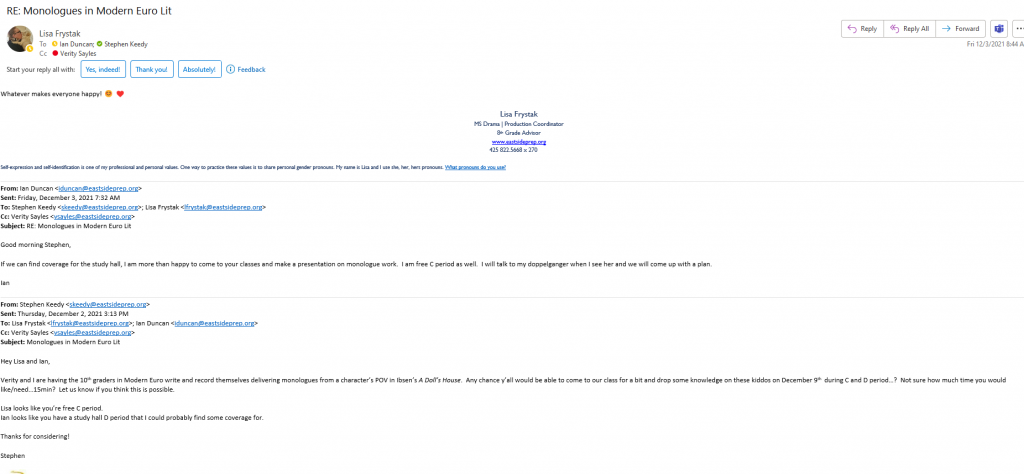The 10th grade Modern Perspectives course described below is a great example to highlight a course that is framed by inquiry, experience, and integration. The course is bookended by the First and Second World Wars and students explore a myriad of topics from First Wave Feminism, Absurdism and Existentialism, creative writing, visual arts, poetry and prose.
The course begins with students reading The Love Song of J. Alfred Prufrock (1915) by T.S. Elliot with no context of the author, the time period in which it was written, or the central themes. They read, annotate, and discuss the work and make predictions about what the course could be about based on central themes they find in the work. While students will generally have some knowledge of Modernism, the poem is altogether foreign to them.
Unit I:
A Doll’s House, Henrik Ibsen
Ibsen’s 1879 groundbreaking play sets the tone that students will be exploring a period of rapid change and development. In this unit students learn about early feminist movements and family life in Europe by way of Ibsen’s play. In preparation for their first major assessment, students utilize this document guiding their annotations.
Tracking in A Doll’s House (1).docx.
Students also explore course content to reflect the contemporary world by way of the monologue project. This monologue drafting document helps students organize their thoughts in preparation for this creative major assessment. Monologue Drafting.docx. The students eventually write, direct, and have the experience of presenting their monologues to the class. Student Monolgue.MOV. In the spirit of integration across disciplines, I had Lisa Frystak and Ian Duncan in the drama department come into the Modern Perspectives course to discuss how to best deliver a monologue.

Finally, we discuss the importance of reading A Doll’s House in conversation with contemporary society. Students watch and discuss On Broadway: “A Doll’s House, Part 2” and participate in a Harkness discussion on ways in which our society is similar and dissimilar to Ibsen’s. We inquire about iust how much have we advanced and what areas does our society still need to address?
Unit II
Moving from Ibsen the course shifts to an exploration of James Joyce’s Dubliners. The work centers on feelings of paralysis, the desire for escape, and the general discontent with the direction Ireland is heading socially and politically in comparision to the rest of Europe. Students explore the frustrations Joyce faced in conversation with lessons in their history class centering on the destabilization Europe experienced during the First World War. After students read and reflect on several short stories from Dubliners they turn their eyes on their own community and integrate what they have learned for a creative writing assignment. Kirklanders_Prompt and Grading (1).docx; Kirklanders Sample.docx
Unit III
There are few books that can evoke responses from students ranging from humor, bewilderment, anger, physical discomfort, pity, and deep sympathy as Kafka’s The Metamorphosis. Students struggle to understand what the ‘meaning’ of the text is and are tempted to dismiss it as nonsense.
After reading the text, the inquiry begins. Students are introduced to several critical theories with which to analyze the work. Autobiographical, Existentialist, Marxist, Feminist, and Psychoanalytical. In groups, students look for meaning in the text by way of critical theory. They have the experience of presenting in groups discussing and debating the benefits and pitfalls of using one theory over another.
MA – The Metamorphosis Critical Analysis 2021-22.docx
Student presentation and debate notes: MA Metamorphosis Analysis Debate-2.docx
Unit IV
Turning our attention to the Second World War students read Albert Camus’ and The Stranger. Exploring the monumental shift in thought in Europe and the world. Integrating our classroom experience with the other Modern Perspectives classes, in a joint final exam created by Bess McKinney, Verity Sayles, Jeff Bandel and myself students explore multiple historical events through the lenses of characters and authors.
Modern Perspectives Joint Final 2022.docx

Finally, at the end of the course, students return to Prufrock’s poem and analyze it using everything they have learned over the trimester in both their literature and history class.